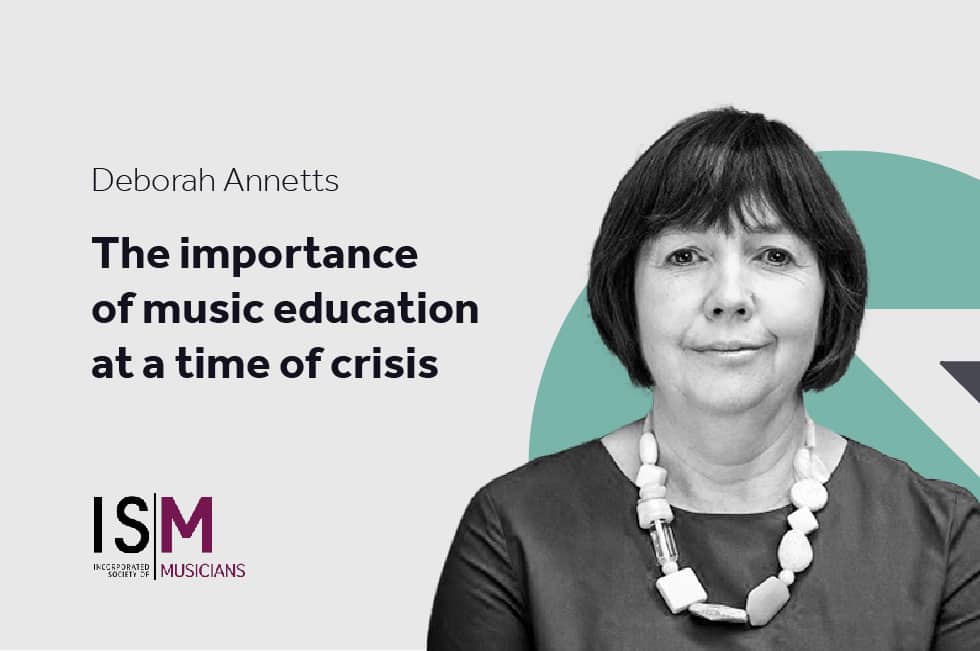As we move into the second year of our work at the Foundation for Education Development (FED) and following the launch of the FED National Education Consultation Report, we hosted a series of roundtable discussions seeking to answer the theme ‘Whatever happened to…?’. This roundtable discussion focussed on ‘Whatever happened to….music education and creative arts?’
We asked Deborah Annetts, Chief Executive at the Incorporated Society of Musicians and FED Advisory Council member, to share her input from the roundtable discussion. In this powerful thinkpiece we are reminded that ‘whilst we are facing an unprecedented crisis in music education, COVID-19 also provides us with a pivotal moment for reflection and an opportunity to reset education policy’.
The importance of music education at a time of crisis
‘Music education must not become the preserve of those children whose families can afford to pay for music tuition’, it’s a simple statement and according to an ISM commissioned poll, 85% of adults agree with it. Despite the support, accountability measures including the English Baccalaureate (EBacc) and Progress 8 have contributed to the decline in music education and other arts subjects in our secondary schools.
These accountability measures disincentivise schools to offer arts subjects. Ofsted [i] have found that around half of schools had moved to a two-year Key Stage 3 model which had resulted in the marginalisation of practical and creative subjects. This has led to inequalities of opportunity for many pupils. Recent ISM research found that 25% of responding secondary school music teachers reported that pupils were not receiving classroom music throughout Key Stage 3 as a continuing result of accountability measures. [ii]
In March 2020, schools across the UK closed due to COVID-19. The ISM report The Heart of the school is missing: Music education in the COVID-19 crisis collated over 1,300 responses from school music teachers across the four nations. We found that all aspects of music education – curriculum entitlement, singing in schools, practical music making, extra-curricular activities, instrumental learning and examinations – were being detrimentally affected.
Music must be central to the recovery curriculum; it can help students to explore and express the varied emotions and challenges that they have experienced during the pandemic as well as many more benefits.
The creative industries are worth more than £116 billion to the UK economy and the music industry is worth £6 billion to the economy. The industries thrive due to a creative pipeline which can only be sustained by investing in the arts in schools.
It is our responsibility to ensure that the education equips young people sufficiently for the 21st century, as technology transforms workplaces and working practices, creativity, entrepreneurship and complex problem-solving skill will be increasingly important.
Whilst we are facing an unprecedented crisis in music education, COVID-19 also provides us with a pivotal moment for reflection and an opportunity to reset education policy. The Government should seize this chance to move away from the ideological knowledge-rich curriculum and reform accountability measures so that arts education can be properly supported and respected. Allowing us to build a curriculum which puts young people’s needs first, championing creative learning in addition to Science, Technology, English and Maths (STEM) and addressing the needs of young people in the post-COVID-19 world. It also offers the opportunity to revisit the nature and purpose of assessments to ensure young people are fully equipped for the future.
About the ISM
The Incorporated Society of Musicians (ISM) is the UK’s professional body for musicians and a nationally recognised subject association for music.
Since 1882, the ISM has been dedicated to promoting the importance of music and protecting the rights of those working in the music profession. The ISM support over 11,000 members across the UK and Ireland with our unrivalled legal expertise, comprehensive insurance and specialist services.
ISM members come from all areas of the music profession, and from a wide variety of genres and musical backgrounds. As well as working musicians, ISM membership also includes part-time and full-time students, and retired musicians.
The ISM campaign tirelessly in support of musicians’ rights, music education and the profession as a whole, and is a financially independent not-for-profit organisation with no political affiliation. This independence allows the organisation the freedom to campaign on any issue affecting musicians.
The ISM was named Individual Member Association of the Year at the UK Association Awards 2021.
References
[i]Curriculum research: How to assess intent and implementation of curriculum
[ii]ISM/UK Music teachers’ survey report Dec 2020



